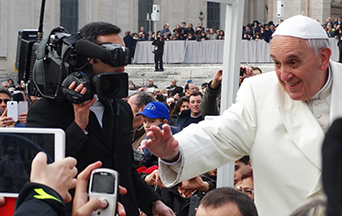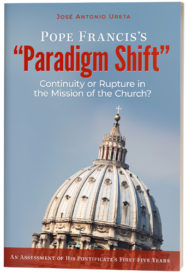
In his book, Pope Francis’s “Paradigm Shift”: Continuity or Rupture in the Mission of the Church? An Assessment of the Pontificate’s First Five Years, José Antonio Ureta spells out many reasons for faithful Catholics to be concerned about the direction in which Pope Francis is taking the Church. In this passage from chapter two, he considers the Pope’s support of the Marxist and global movements, which act in manners contrary to Church teaching. He especially describes Pope Francis’s advocacy of an important Marxist idea – a classless society. The excerpt reads:
✧ † ✧
For Pope Francis, the Christian ideal is a society without social classes. Speaking to a boy from the The Peace Factory NGO who asked him: “But according to you, pope, one day we will all be equal?” the pontiff responded: “This question can be answered in two ways: we are all equal—all!—but this truth is not recognized, this equality is not recognized, and therefore some are—let’s say the word, but between quotation marks—happier than others. But this isn’t a right! We all have the same rights! When this is not acknowledged, that society is unjust [sic]. It isn’t according to justice.”1
New Book: Order Your PRINT Copy Today!
In his Apostolic Exhortation Evangelii Gaudium, in the section titled, “No to the inequality which spawns violence,” Pope Francis stated: “Until exclusion and inequality in society and between peoples are reversed, it will be impossible to eliminate violence.” He then added, “This is not the case simply because inequality provokes a violent reaction from those excluded from the system, but because the socioeconomic system is unjust at its root.” Furthermore, he said: “Inequality eventually engenders a violence which recourse to arms cannot and never will be able to resolve.”2 In short, according to Pope Francis, “Inequality is the root of social ills.”3 This is at variance with Catholic social doctrine, which teaches that sin is the root of all evil (including social evils), and the essential equality of all the baptized as children of God and heirs of Heaven does not contradict accidental inequality resulting from varied talents, diligence, education, and condition.4

Order PRINT copy.
By favoring a classless society, it is no wonder that Pope Francis sympathizes with liberation theology and especially its Argentine version, known as “Theology of the People.”5 The latter was conceptualized by Fr. Lucio Gera6 and Fr. Juan Carlos Scannone.7 The difference between this and other strains of this erroneous theology is that the driving force building the Kingdom is not left-wing political groups or unions—generally secularists. Instead, the Argentine form of liberation theology has a Gramscian matrix and a third world, Peronist bias. It attributes the role of fomenting revolution to the Latin Americans in their struggle against Anglo-Saxon8 imperialism and considers the dynamism of their religious beliefs as the greatest potential element for advancing the revolution.9
* * *
José Antonio Ureta’s book is a startling and disturbing assessment that should be read by every person who is concerned about the changes that Pope Francis is trying to force upon the Church. Purchase the book through this link or download it at no charge by using the link below.
Purchase the book, Pope Francis’s “Paradigm Shift” here
Free Download Pope Francis’s “Paradigm Shift” here
Footnotes
- “Pope’s Audience With Children of ‘The Peace Factory,’” Zenit, May 12, 2015, https://zenit.org/articles/pope-s-audience-with-children-of-the-peace-factory/.
- Francis, Apostolic Exhortation Evangelii Gaudium, Nov. 24, 2013, nos. 59, 60, http://w2.vatican.va/content/francesco/en/apost_exhortations/documents/papa-francesco_esortazione-ap_20131124_evangelii-gaudium.html.
- Ibid., no. 202.
- Leo XIII teaches: “No one doubts that all men are equal one to another, so far as regards their common origin and nature, or the last end which each one has to attain, or the rights and duties which are thence derived. But, as the abilities of all are not equal, as one differs from another in the powers of mind or body, and as there are very many dissimilarities of manner, disposition, and character, it is most repugnant to reason to endeavor to confine all within the same measure, and to extend complete equality to the institutions of civic life.” Leo XIII, Encyclical Humanum Genus, Apr. 20, 1884, no. 26, http://w2.vatican.va/content/leo-xiii/en/encyclicals/documents/hf_l-xiii_enc_18840420_humanum-genus.html.
- For a summary view of the origin and proposals of the Theology of the People, see João Vitor Santos, “O Papa Francisco e a teologia do povo: entrevista especial com Juan Carlos Scannone,” trans. André Langer, Revista IHU Online, no. 465 (May 18, 2015), http://www.ihuonline.unisinos.br/index.php?option=com_content&view=article&id=5919&secao=465.
- In recognition of Fr. Lucio Gera’s work, Cardinal Jorge Mario Bergoglio, archbishop of Buenos Aires, had him interred in the crypt of that city’s cathedral.
- “Juan Carlos Scannone, a Jesuit, was a professor at several Latin-American and European universities, including the Pontifical Gregorian University. He is a former dean of the San Miguel College of Philosophy and Theology of the University of Salvador. He is considered the greatest living theologian. A disciple of Karl Rahner, he actively participated in the development of the intense post-conciliar debate in Latin America.” “Prof. Dr. Juan Carlos Scannone–Argentina,” Instituto Humanitas Unisinos, Dec. 15, 2017, http://www.ihu.unisinos.br/184-conferencistas/574652-prof-dr-juan-carlos-scannone-argentina.
- In the above-cited interview, Juan Carlos Scannone states: “Although he does not consider class struggle as a ‘determining hermeneutic principle’ to understand society and history [the Theology of the People] attributes an historical role to conflict—even class [struggle]—by conceiving it from the previous unity of the people. Accordingly, institutional and structural injustice is understood as betrayal of the people by a part of it which thus becomes anti-people.” Santos, “O Papa Francisco e a teologia do povo.”
- In his interview with Dominique Wolton, Francis explains the difference: “In the 1980s there was a tendency toward a Marxist analysis of reality, but later it was renamed ‘theology of the people.’ I do not really like the name, but that is how I got to know it. To go with the people of God and do the theology of culture. There is a thinker you should read: Rodolfo Kusch, a German who lived in northeastern Argentina, a very good philosopher and anthropologist. He made me understand one thing: The word ‘people’ is not a logical word. It is a mythical word. One cannot speak of people logically because it would only be a description. To understand a people, to understand the values of this people one must enter into the spirit, the heart, the work, the history and myth of their tradition. This point is truly at the basis of the theology called ‘of the people.’ That is to say, to go along with the people, to see how they express themselves.” Wolton, Politique et société, 47–8. Commenting on this passage, Vatican analyst Sandro Magister adds an interesting point: “Kusch took his inspiration from Heidegger’s philosophy to distinguish between ‘being’ and ‘dwelling,’ describing with the first category the rationalistic and domineering vision of Western man and with the second the vision of the indigenous Latin American peoples, in peace with nature and animated by none other than a ‘myth.’” Sandro Magister, “The Myth of the ‘Pueblo’: Francis Reveals Who Told It to Him,” L’Espresso–Settimo Cielo, Sept. 18, 2017, http://magister.blogautore.espresso.repubblica.it/2017/09/18/the-myth-of-the-pueblo-francis-reveals-who-told-it-to-him/.
